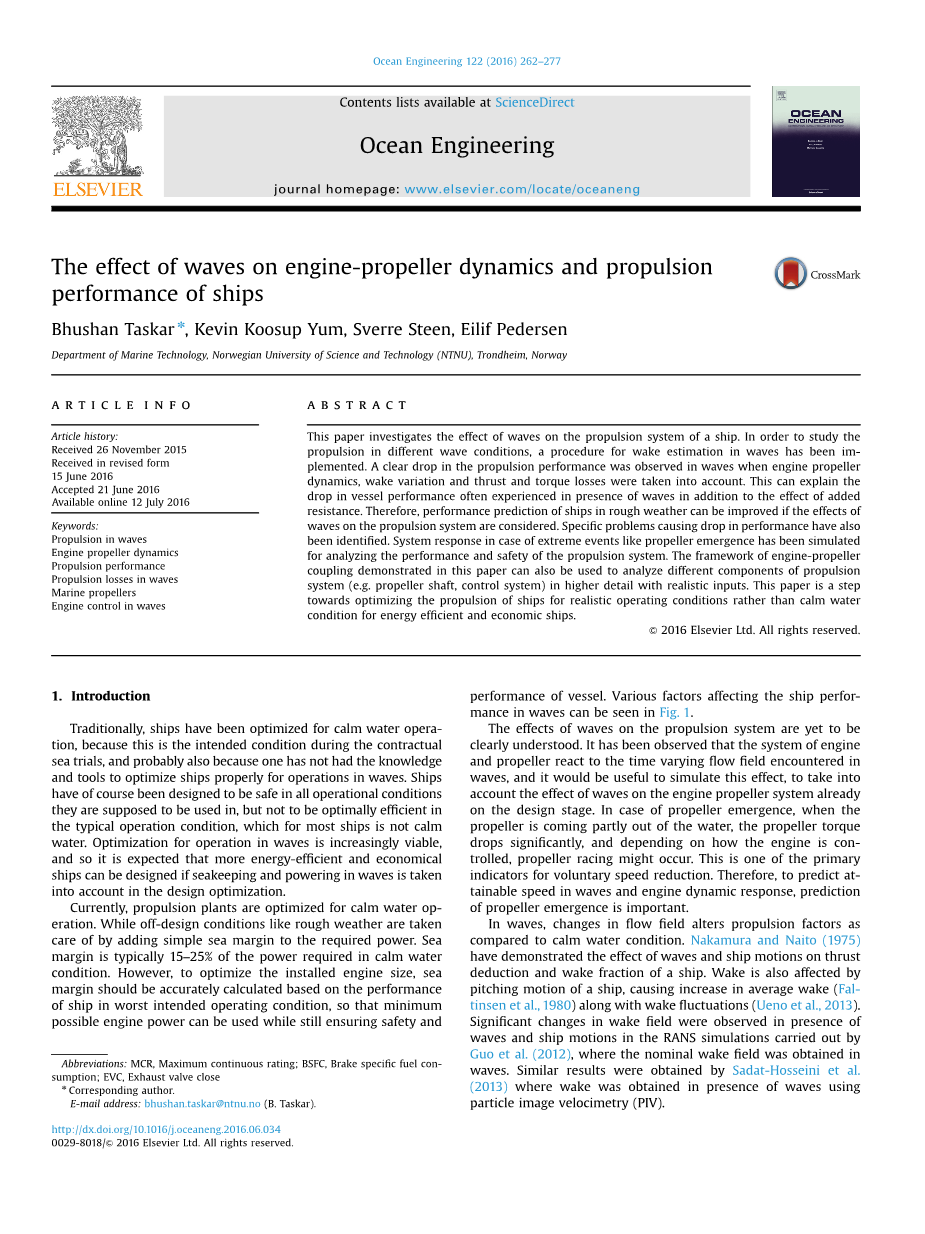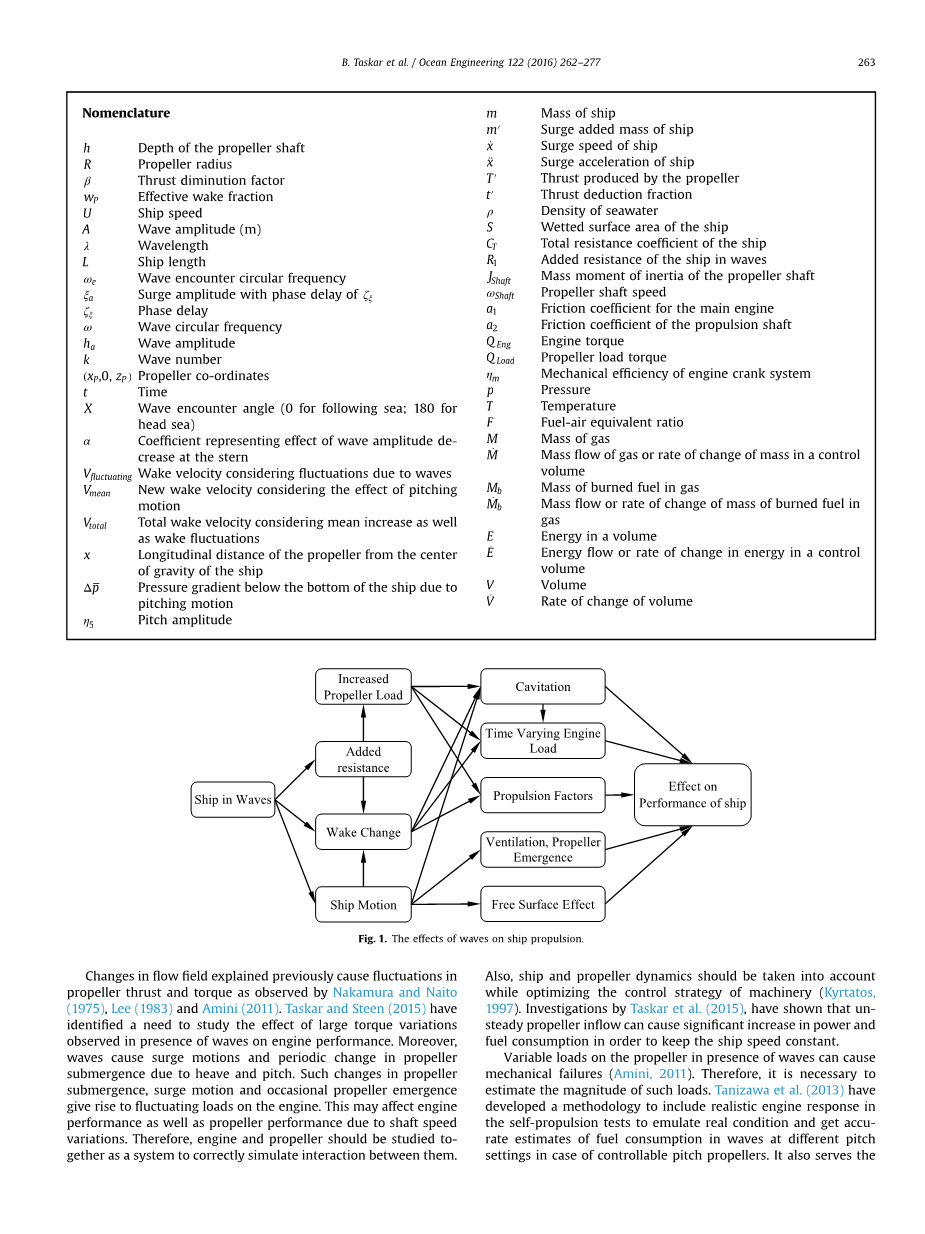

英语原文共 16 页,剩余内容已隐藏,支付完成后下载完整资料
|
The effect of waves on engine-propeller dynamics and propulsion performance of ships |
波浪对发动机的动力学性能和动力性能的影响。 |
|
Keywords: Propulsion in waves Engine propeller dynamics Propulsion performance Propulsion losses in waves Marine propellers Engine control in waves |
关键字: 波浪推进 螺旋桨动力性能在波浪螺旋桨中的损失 波浪中的发动机控制 |
|
Abstract This paper investigates the effect of waves on the propulsion system of a ship. In order to study the propulsion in different wave conditions, a procedure for wake estimation in waves has been implemented. A clear drop in the propulsion performance was observed in waves when engine propeller dynamics, wake variation and thrust and torque losses w ere taken into account. This can explain the drop in vessel performance often experienced in presence of waves in addition to the effect of added resistance. Therefore, performance prediction of ships in rough weather can be improved if the effects of waves on the propulsion system are considered. Specific problem s causing drop in perform ance have also been identified. System response in case of extreme events like propeller emergence has been simulated for analyzing the perform ance and safety of the propulsion system . The framework of engine-propeller coupling demonstrated in this paper can also be used to analyze different com ponents of propulsion system (e.g. propeller shaft, control system ) in higher detail w ith realistic inputs. This paper is a step towards optimizing the propulsion of ships for realistic operating conditions rather than calm water condition for energy efficient and economic ships. |
摘要 本文研究波浪对船舶推进系统的影响。为了研究在不同的波浪条件下,推进系统的工作情况。一种波浪尾流分离的方法被提出来。当考虑到推进器受力不均匀,尾流变化以及推力和扭矩损失的情况下,可以观察到在波浪中,发动机推进器中观的推进性能明显下降。这可以解释在波浪中,除了扩量程电阻的影响外,船舶性能下降的原因。因此,如果考虑波浪对推进系统的影响,可以提高船舶在复杂水域中的性能预测。导致性能下降的具体问题也能够被确认。为了分析推进系统的性能和安全性,对螺旋桨等极端情况下的系统响应进行了仿真。本文所述的发动机-螺旋桨联轴器模型,也可用于对推进系统(如螺旋桨轴、控制系统)的不同组件在不同的输入下进行较详细的实际分析。本文是研究实际操作条件下,船舶最优化的推进系统,而不是在平静水条件下,最有效率和最节能的船舶。 |
|
1.Introduction Traditionally, ships have been optimized for calm water operation, because this is the intended condition during the contractual sea trials, and probably also because one has not had the knowledge and tools to optimize ships properly for operations in waves. Ships have of course been designed to be safe in all operational conditions they are supposed to be used in, but not to be optimally efficient in the typical operation condition, which for most ships is not calm water. Optimization for operation in waves is increasingly viable, and so it is expected that more energy-efficient and economical ships can be designed if seakeeping and powering in waves is taken into account in the design optimization. |
1介绍 传统意义上,船舶是在平静的水域中利用的,因为这是公认的海上试验目标条件。而且大概是因为人们还没有掌握适当的利用船舶在波浪中的操作的知识和工具。当然,船舶的设计已经确保了在所有可能的操作环境下都是安全的,但是对于大多数在不平静的水域的船舶中,传统的操作条件下不能达到最佳效果。波浪中,船舶操作的优化的逐渐变得可行。在设计优化过程中,如果采用消浪和波浪动力的方法,,可以设计如果采用消浪和波浪动力的方法出更多节能、经济的船舶。 |
|
Currently, propulsion plants are optimized for calm water operation. While off-design conditions like rough weather are taken care of by adding simple sea margin to the required power. Sea margin is typically 15–25% of the power required in calm water condition. However, to optimize the installed engine size, sea margin should be accurately calculated based on the performance of ship in worst intended operating condition, so that minimum possible engine power can be used while still ensuring safety and performance of vessel various factors affect the ship performance in waves can be seen in Fig. 1 .The effects of waves on the propulsion system are yet to be clearly understood. It has been observed that the system of engine and propeller react to the time varying flow field encountered in waves, and it would be useful to simulate this effect, to take into account the effect of waves on the engine propeller system already on the design stage. In case of propeller emergence, when the propeller is coming partly out of the water, the propeller torque drops significantly, and depending on how the engine is controlled, propeller racing might occur. This is one of the primary indicators for voluntary speed reduction. Therefore, to predict at tainable speed in waves and engine dynamic response, prediction of propeller emergence is important. |
目前,推进优化都是围绕船舶在静水中运行而展开的。当考虑到非设计的条件,如恶劣的天气,是通过在海的边缘增加能量。海缘通常是平静水所需能量的15-25%。然而,为了优化已安装的发动机尺寸,应根据船舶在最恶劣的预期工况下的性能,精确计算船舶的海上裕度。这样就可以在保证安全和正常的同时使用尽可能少的发动机动力。影响船舶在波浪中的性能的各种因素可以在图1中看到。 波浪对推进系统的影响还有待清晰的理解。据观察,发动机和螺旋桨系统对波浪中遇到的时变性变化有反应。而且模拟这个效用会很有用。波浪对发动机螺旋桨系统的影响的系统已经处于设计阶段。为了避免螺旋桨的浮出水面,当部分螺旋桨从水里出来的时候,螺旋桨扭矩明显下降,根据发动机的控制方式,可能会发生螺旋桨加速。这是自动减速的主要指标之一,因此,对螺旋桨的出现进行预测,对于预测波浪中的速度和发动机的动力响应是非常重要的。 |
|
In waves, changes in flow field alters propulsion factors as compared to calm water condition. Nakamura and Naito (1975) have demonstrated the effect of waves and ship motions on thrust deduction and wake fraction of a ship. Wake is also affected by pitching motion of a ship, causing increase in average wake (Faltinsen et al., 1980) along with wake fluctuations (Ueno et al., 2013). Significant changes in wake field were observed in presence of waves and ship motions in the RANS simulations carried out by Guo et al. (2012), where the nominal wake field was obtained in waves. Similar results were obtained by Sadat-Hosseini et al. (2013) where wake was obtained in presence of waves using particle image velocimetry (PIV |
与平静的水环境相比,波浪中低功率的变化改变了推进因素。Nakamura和Naito(1975年)论证了波浪和船舶运动对船舶推力推导和尾流分数的影响,尾流也受船舶俯仰运动的影响,。引起平均尾迹增加(Fal-丁森等人,1980年),以及尾流效应(Ueno等人,2013年)。在波浪和船舶运动存在的情况下,观测到尾流场的信号变化。Guo et al. (2012) 进行的RANS模拟。(2012),其中公称尾流场是在波浪中获得的。萨达特-霍塞尼等人也得到了类似的结果。(2013)在场的守夜人 用粒子图像测速法(PIV)测量波。 |
|
Changes in flow field explained previously cause fluctuations in 全文共62994字,剩余内容已隐藏,支付完成后下载完整资料 资料编号:[13260],资料为PDF文档或Word文档,PDF文档可免费转换为Word |
以上是毕业论文外文翻译,课题毕业论文、任务书、文献综述、开题报告、程序设计、图纸设计等资料可联系客服协助查找。


